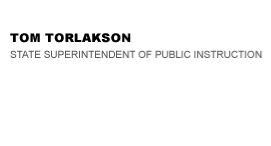July 17, 2017 ESSA Update #8 Letter


Official Letter
Official Letter
Dear County and District Superintendents and Charter School Administrators:
EVERY STUDENT SUCCEEDS ACT – Update #8
The purpose of this letter is to update you on California’s transition to the Every Student Succeeds Act (ESSA). Included in this letter is a reminder regarding the elimination of No Child Left Behind (NCLB) teacher requirements and an update regarding Title I, Part A requirements for the 2017–18 school year.
Elimination of No Child Left Behind Teacher Requirements
Section 1119 of the NCLB Act required all teachers of core academic subjects in the state to be “highly qualified.” This meant that every teacher of a core academic subject was required to meet the following three requirements:
- Hold a bachelor’s or higher degree;
- Hold an appropriate State authorization for the assignment; and
- Demonstrate subject matter competence for each core academic subject assigned to teach.
Under the ESSA, states are not required to implement Section 1119 of the NCLB. Teachers may be assigned solely based on state certification and licensure criteria. Therefore, teachers are legally assigned so long as the assignment has been based upon the issuance of a California license or certificate, including the use of California Education Code options and permits that allow teachers to teach outside of their certification area.
If you have any questions regarding this subject, please contact Erin Koepke, Education Programs Consultant, Educator Excellence Office, by phone at 916-323-4873 or by e-mail at EKoepke@cde.ca.gov.
Title I, Part A Update for the 2017–18 School Year
This update includes information pertaining to the 2017–18 requirements for Local Educational Agency Plans, program improvement, alternative supports, Public School Choice, equitable services, school support and improvement, and Title I, Part A reservations and expenditures that may impact the upcoming school year. If you have questions or need further clarification regarding any of these topics, please contact the program staff listed below for more information.
Overview
On December 10, 2015, President Barack Obama signed the ESSA, which reauthorized and updated the Elementary and Secondary Education Act (ESEA). Most of the new provisions required by the ESSA will take effect starting in the 2017–18 school year (SY); however, there are some provisions that will not take effect until the 2018–19 and 2019–20 SYs, respectively.
This update describes the Title I, Part A programs and activities that will be required in the 2017–18 SY, along with the reservations required of local educational agencies (LEAs) administering Title I, Part A programs. The purpose of Title I, Part A is to provide all children with a significant opportunity to receive fair, equitable, and high-quality education and to close educational achievement gaps.
Local Educational Agency Plans
LEAs, including direct-funded charter schools, applying for or currently receiving Title I, Part A federal funds will not be required to submit new LEA plans during the 2017–18 transition year but will be required to certify adherence to the required ESSA assurances through the Consolidated Application and Reporting System (CARS) during the 2017 spring collection period. LEAs, including direct-funded charter schools, applying for or currently receiving funds may include Title I, Part A activities in their Local Control and Accountability Plan (LCAP) or an LEA’s Title I, Part A summary expenditure reports. LEA plans will not be reviewed during a Compensatory Education Federal Program Monitoring review in the 2017–18 SY; however, LEAs may be asked to provide budget and expenditure reports detailing district-level activities funded by Title I, Part A reservations as reported in the CARS.
For more information regarding LEA Plans, please contact the Local Agency Systems Support Office by e-mail at LCFF@cde.ca.gov or by phone at 916-319-0809.
Program Improvement
Beginning in the 2017–18 SY, LEAs and schools will no longer be identified for Program Improvement (PI) or be required to implement specific PI-related activities. In addition, LEAs will not be required to set aside any PI reservations for the 2017–18 SY. LEAs and schools previously identified for PI are encouraged to use evidence-based interventions, which may include alternative supports that are designed to improve the academic achievement of socioeconomically disadvantaged students.
For more information regarding PI, please contact Jacqueline Matranga, Education Programs Consultant, District Innovation and Improvement Office, by e-mail at JMatranga@cde.ca.gov or by phone at 916-445-4905.
Alternative Supports
For the 2017–18 SY, LEAs will not be required to set aside a reasonable amount of Title I, Part A funds for alternative supports. LEAs are encouraged to use evidence-based interventions that are reasonable, necessary, and consistent with Title I, Part A of the ESSA.
For more information regarding alternative supports, please contact Sylvia Hanna, Education Programs Consultant, Title I Policy and Program Guidance Office, by e-mail at SHanna@cde.ca.gov or by phone at 916-319-0948.
School Choice
LEAs must allow students who previously transferred to another public school under the No Child Left Behind Act (NCLB) to remain in that school until the child has completed the highest grade offered in that school. However, for the 2017–18 SY, LEAs may, but will not be required to, offer Title I, Part A Public School Choice (Choice) to any additional eligible students.
LEAs that have students who previously transferred to another public school prior to the 2017–18 SY, must set aside Title I, Part A funds for Choice-related transportation.
For more information regarding Choice, please contact Lana Zhou, Education Research and Evaluation Consultant, Title I Policy and Program Guidance Office, by e-mail at LZhou@cde.ca.gov or by phone at 916-319-0956.
Equitable Services for Eligible Private School Students
LEAs will be required to provide eligible private school children with Title I, Part A educational services and other benefits to those provided to eligible public school children. Title I, Part A services for eligible private school children must be developed in consultation with private school officials and be done in a timely and meaningful manner. In the 2017–18 SY, LEAs must reserve a proportional share of Title I, Part A funds for equitable services prior to any allowable expenditures or transfers.
For more information regarding alternative supports, please contact Sylvia Hanna, Education Programs Consultant, Title I Policy and Program Guidance Office, by e-mail at SHanna@cde.ca.gov or by phone at 916-319-0948.
Title I, Part A Required Reservations
LEAs that receive Title I, Part A funds will be required to reserve the following set asides for the 2017–18 SY:
- Parent and Family Engagement: LEAs with a Title I, Part A allocation (including transfers) in excess of $500,000 must reserve at least 1 percent of the LEA’s Title I, Part A allocation for parent and family engagement activities pursuant to Section 1116 of the ESSA.
- Homeless Services: LEAs must reserve Title I, Part A funds as are necessary to provide services to homeless children comparable to those provided to children enrolled in schools receiving Title I, Part A funds pursuant to Section 1113(b)(3) of the ESSA.
- Neglected and Delinquent Children: LEAs must reserve, if applicable, Title I, Part A funds to provide services comparable to those provided to children enrolled in schools receiving Title I, Part A funds to serve children in local institutions for neglected children, local institutions for delinquent children, and neglected or delinquent children in community day school programs pursuant to Section 1113(b)(3) of the ESSA.
- Equitable Services: As stated in ESSA Section 1117(a)(4)(A)(ii), LEAs must reserve a proportional share of Title I, Part A funds for equitable services prior to any allowable expenditures or transfers.
- Choice-related Transportation: LEAs that have students participating in Choice under NCLB, must set aside Title I, Part A funds for Choice-related transportation until the student completes the highest grade in the school.
For more information regarding Title I, Part A reservations, please contact the Title I Policy and Program Guidance Office by e-mail at TitleI@cde.ca.gov or by phone at
916-319-0917.
School Support and Improvement Activities
The California Department of Education (CDE) will notify LEAs with schools identified for comprehensive support and improvement beginning in the 2018–19 SY and will notify LEAs with schools identified for targeted support and improvement beginning in the 2018–19 SY as required in Section 1111(d) of the ESSA. During the 2017–18 SY, LEAs are not required to implement new school improvement activities as described in Section 1111(d)(1)(B) of the ESSA.
During the 2017–18 SY, LEAs and their identified schools are encouraged to use the California School Dashboard to identify district and school strengths and areas for improvement in preparation for implementation of comprehensive support and improvement requirements beginning in the 2018–19 SY.
For more information regarding school support and improvement activities, please contact the School Turnaround Office by e-mail at STO@cde.ca.gov or by phone at 916-319-0833.
Authorizing Title I, Part A Expenditures
Title I, Part A funds must be fully and thoughtfully committed to proven evidence-based strategies that improve the overall academic success for all students, and in particular, for those students who are disadvantaged. The CDE recommends that LEAs with schools authorized to operate as a schoolwide program consider the following general criteria when approving activities supported with Title I, Part A funds:
- Activities meet a need identified in the comprehensive needs assessment;
- Be an evidenced-based educational strategy;
- Is reasonable and necessary;
- Has been approved by the school site council and local governing board;
- Is included in the Single Plan for Student Achievement; and
- Is annually evaluated for effectiveness.
LEAs are encouraged, not required, to use Title I, Part A funds to implement actions identified in their LCAP. All district-wide or centralized activities supported with Title I, Part A funds should be included in a district-level planning document, meet an identified need aligned to the LCAP, be representative of an evidence-based strategy, and be annually evaluated for effectiveness.
For more information regarding Title I, Part A expenditures, please contact the Title I Policy and Program Guidance Office by e-mail at TitleI@cde.ca.gov or by phone at 916-319-0917.
Sincerely,
/s/
Tom Torlakson
TT:bm
